Hinduism is the world’s third largest religion with an estimated 1 billion adherents or approximately 14% of the world population of 6.9 billion. Some of my friends belonging to other faiths have, on a number of occasions, told me derisively that Hinduism is no religion, that it is only a way of life.
Many Indian writers have spoken and written about the virtues of showing toleration towards other religions by the Hindus. In one of his important literary works ‘The Discovery of India’, the illustrious politician and freedom-fighter, the late Shri Jawaharlal Nehru extols Hinduism for being a way of life rather than a rigid structure.
Hinduism, like every other religion, has its own world view or conception of life and reality. This Hindu view of life and existence is founded on a few fundamental concepts summed up in six key words: Jivatma (read as Jivaatmaa), Paramatma (read as Paramaatmaa), Karma, Punarjanma, Maya (read as Maayaa) and Moksha (read ‘o’ as in ‘roll’). To understand Hinduism and how it perceives the world, we need to clearly understand what these 6 words mean and connote. The purpose of this article is precisely to do that in as simple a manner as possible.
[wp_ad_camp_1]
Paramatma (Parama+Atman) or Brahman:
This is the universal soul or spirit, the Absolute which pervades the entire universe. (In English, it is addressed as God). The universe and all objects within it have emanated from this one self-existent absolute impersonal spirit, the Paramatma (Supreme soul), the eternal object of meditation and knowledge. All the material contents of the universe, which include the living as well as the non-living, are like a spider’s web in which every thing is connected to everything else. So in Hindu philosophy/theology, creation flows out from Brahman and is a part of Brahman. The word Brahman is derived from the root brih and literally means growth, expansion, evolution, swelling of the spirit or the soul. It is a sacred word like Veda is a sacred text. Paramatma is formed from the two words parama (highest, chief, most excellent, best, supreme), and atman, atma (read as atmaa) or spirit.
Jivatma (Jiva + Atman)
Jivatma is any living personal soul that resides within all the living beings, not in humans alone. Jiva is anything living or any living object. Atman is the soul or the spirit. Hinduism postulates that this jivatma is in essence the same in all living systems and is one with Paramatma.
Karma:
Every jivatma is bound by the law of karman or act. The law stipulates that the moral quality of a person’s or animal’s actions determines the nature of his/her future existence or incarnation. To put in simple words, what the theory of karma tells is: if you do good deeds or karmas, you will receive good things in return. If you do bad deeds, you will get bad things in return. The karma theory introduces the concept of inevitable consequences in life, a system of transcendental reward and punishment which sticks to us in an unending chain not only for one life but for all the lives, past present and future. This naturally leads to fatalism, the concept of an irrevocable destiny in which a former act leads to inevitable result as the certain consequence of acts in the previous life or lives. Karma-paka and karma-vipaka are two Sanskrit words which mean the ‘ripening (paka) of actions (karma)’, that is the good or the evil consequences in this life of human acts performed in previous births. 86 such consequences are spoken of in the epic Mahabharata and elsewhere. A person suffers because he has done some bad karma in the present life as well as in all the previous births. If he has a cozy life in the present birth, it is because of the accumulated good karmas (sattvic deeds) of all his previous births.
Karma determines births. A lowly station in the present life is due to some bad things done in previous births. A rich or privileged circumstance in the present life is because of accumulation of lots of punya (religious merit) in earlier births.
Maya
Maya means illusion, deception, unreal or illusory image. In Hindu philosophy, Maya is looked upon as that curtain of ignorance which envelops and shields our consciousness from seeing our true divine nature and makes us feel that we are different from Paramatman Brahman, the one and the only one true reality that lies hidden behind this world of beings and becoming. What we experience in our normal state of existence is nothing but Maya. We are under the delusion of this Maya and the ignorance or ‘ajnana’ (read as anjaana)’ that results from this deceptive perception makes us take the unreal as real, the rope (unreal) for the snake (real). Maya is also likened, sometimes, to dust on a mirror’s surface that prevents us from seeing the true reflection/image of an object. Mirror is here the pure consciousness of our mind and the dust is the moha caused by maya. Maya is a kind of pasa or snare that causes moha and entangles the soul of every living thing.
This does not mean that what we see around is unreal, as some people wrongly interpret. All the objects in the universe are real. But they are of a lower level of reality than Paramatma Brahman, the primary reality. You may call the physical world the secondary reality. There is no conflict between jivatma and paramatma because Maya is not disobedience against Paramatma. It is a peaceful existence between the two atmas based on mutual toleration.
The theory of Maya and the Jivatma-Paramatma theory assume that reality is not two, na dvaita; but only one, though the learned Brahmanas speak of many. Ekam sat viprah bahudhah vadanti. Jivatma and paramatma, being the same in essence, the jivatma can merge in paramatma and become one with it. Reality then becomes one, not two, advaita. This union (yoga) of the individual spirit with the supreme spirit is a mathematical/conceptual one
Hindu religion does speak about the creative activity (rajas guna) of Brahman; but the creation is an emanation from Brahman like the web that issues from a spider. There is no essential distinction between the Creator (Paramatma Brahman) and his Creation (Brahmanda). When this distinction is lost, there is no difference between the Supreme Self and the empirical Universe.
Punarjanma (Punar + Janman):
Punar means again, again and again, repeatedly. Janma means birth or life. So Punarjanma means re-birth, reincarnation or regeneration of the soul. It is metempsychosis.
Karma and punarjanma go hand in hand. They are the two sides of the same coin. We are born again and again because of the bad deeds we committed in the present as well as in the previous lives.
Cases of supposed re-incarnation keep being reported in media. Many years ago, I saw a 1975 English movie by the name “Re-incarnation of Peter Proud”. The film was gripping like all films of such genre. But the truth is: none of those stories of rebirth or reincarnation have been substantiated to-date.
Moksha:
This is the ultimate goal of life, says Hinduism. Moksha means emancipation, liberation; release from worldly existence or transmigration. In the present context, Moksha means the final or eternal emancipation, salvation or the deliverance from the cycle of births and rebirths and attainment of and union with Brahman. It is well nigh impossible to explain what that state of union with Brahman (Brahmatva) is because it is a subjective experience that is beyond words and description. It has been said by Rishis that this state is like a drop of water merging with the ocean and becoming an integral part of it. The Upanishadic pronouncements Aham Brahmaasmi (I am Brahman) and Tat Tvam Asi (You Are That) are well-known and often quoted in learned circles; even lay Hindus quote them. They are the buzz-words of Hindu religious faith.
When a person comes to realize his identity with Paramatma, he is liberated for good. Rebirth ceases for him for all time to come. Such a person becomes known as a Brahma-jnanin, Parama-jnani, Atma-jnani, Brahma-vidvas, Brahmana or Yogi. The knowledge so acquired is sacred or spiritual and is opposite to religious observances and bodily mortifications (Tapas). This highest knowledge is called Atma-jnaana, Brahma-jnaana, and Brahma-vidya in Sanskrit; in English, it is known as Self-realisation or God-realization.
The author, Dr. Sachidanand Das, can be contacted on facebook.

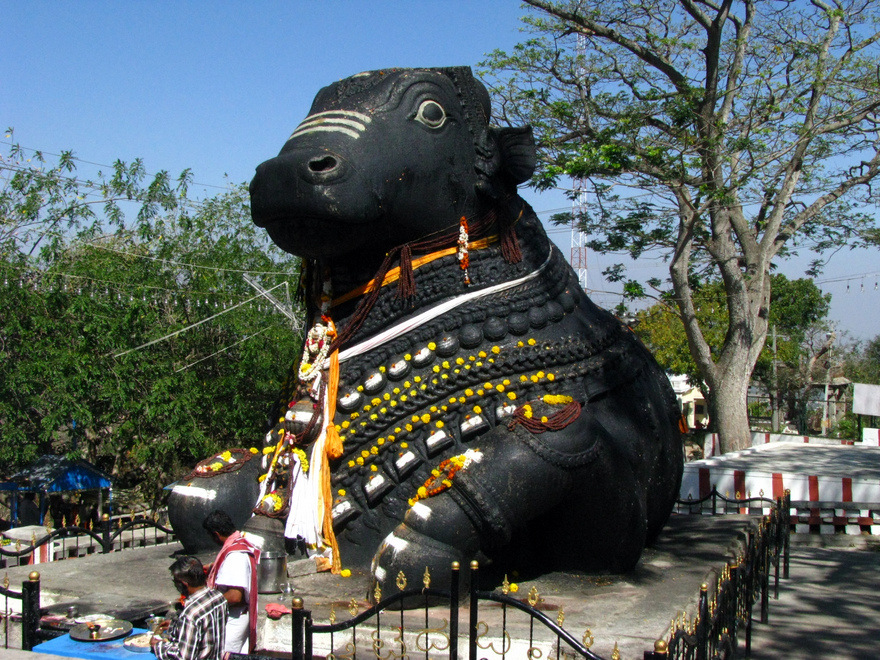
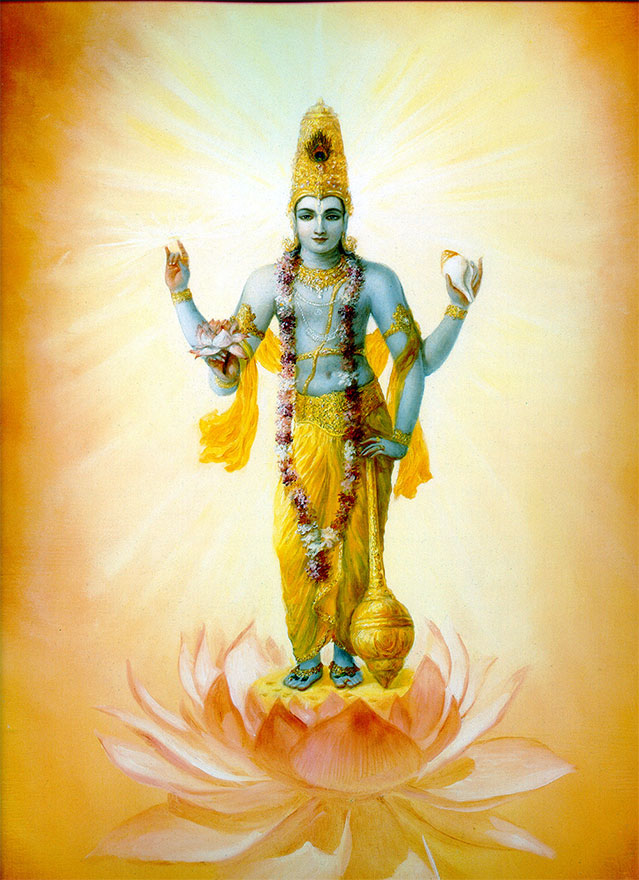
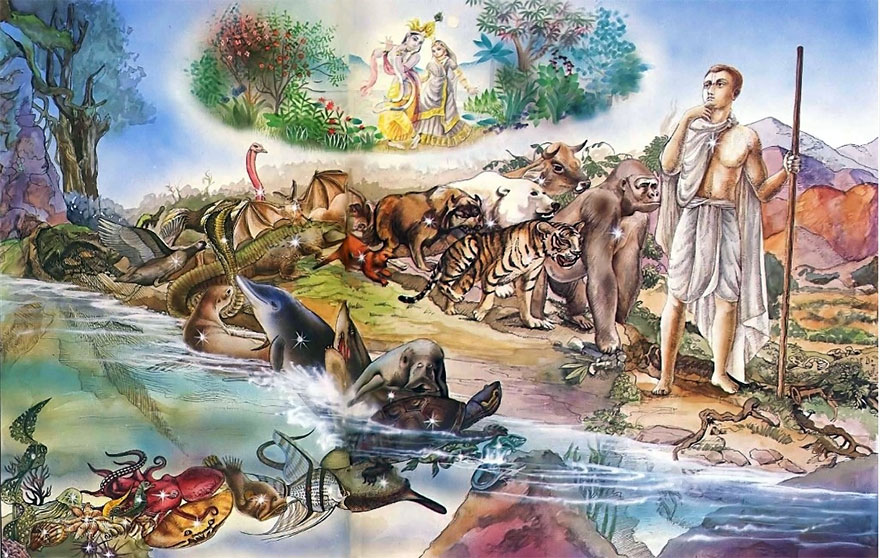
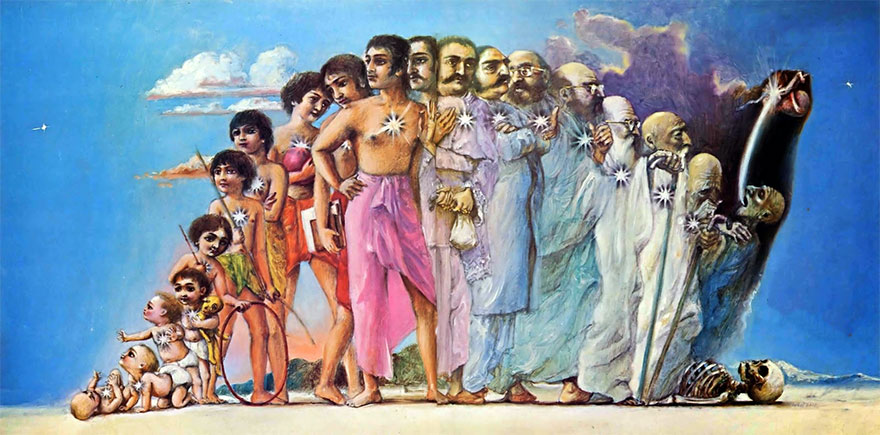
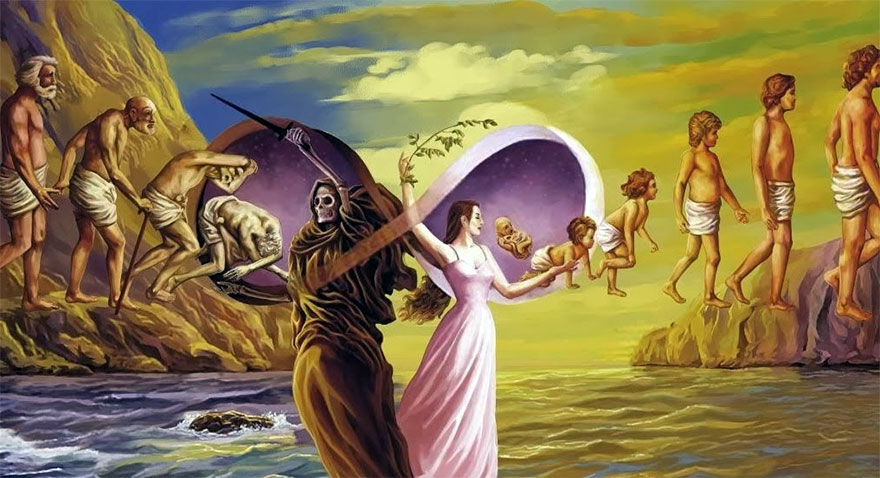
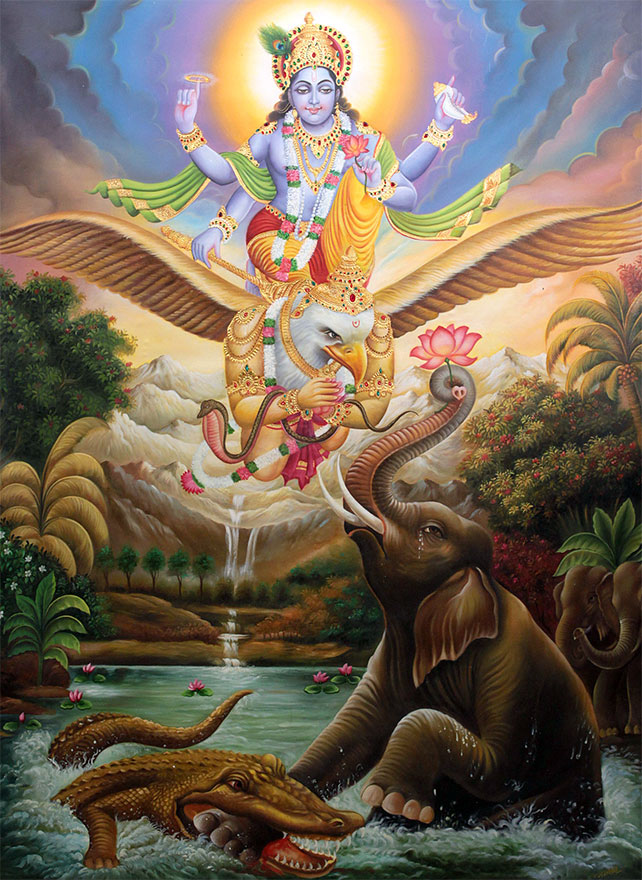











Our sincere thanks to Dr. Das for presenting a very simple explanation what fundamental concepts of Hinduism are! Our request to him: Please write here often!
About reincarnation: Once a English lady when to Kanchi kaamakoti and asked. – Sir, how do you prove that there was past life? – Swamiji ignored the question. She came next day and asked the same question. After the third time, she answered her- Please go to the Maternity ward in the next street and stay there for three days and observe what happens there. After that you can comeback and ask this question. She went and observed and came back and said – Sir, I got the answer, thank you. When a bystander asked how got the answer in the maternity ward – She replayed – I saw some babies born and are welcomed by big pomp and show with lot of gifts. I also saw some babies being welcomed by just few of the family relatives. For some, only mothers are there and fathers are out there trying to earn to pay for the deliveries. I also saw police bringing pregnant mother and babies that nobody wanted. These disparities in the fates of these new born babies cannot be accounted unless these disparities can be accounted by their previous birth merits and demerits.
good
The word Hindu is related to Sneha – Love and this is related to Ahimsa. The author had completely forgotten this aspect of Hinduism. The tolerance Hindus show is a result of the adherence to ahimsa.
Super
Extremely well written and Details Article . I have Read a Lot of Stories on Punarjanam on the net and I completely Agree with the concept of Punarjanam.
Even if there is no Proof.
Dear Sir,
It is a wonderful series of articles, though it leaves some doubts in our mind. Astrology and Karma philosophy are closely linked. Astrology says what is going to happen with you in this life. It decides even minute aspects of present life not excluding our nature, intentions. those with Jupiter’s lagna have a benevolent disposition and will do good deeds in life, not so for those with Saturn, Mars etc. This is my experience too. Thus, then, how a person can be responsible for his actions which in fact, is the wish of almighty. Thus, which is Karma and is going to accumulate to be ripened is the moot question. Please help explain.
It is too good.
Very enlightening post indeed. Please restart sending your regular posts on health and wellbeing.
B K DHIR
thank u
Excellent introduction to Hinduism. Some concepts well explained, albeit
briefly. Would be useful if the author could write more such articles.
Very good article about Hinduism
सनातन सत्य
Dr Sacidanandan should understand that it’s not only bad deeds but also good deeds that bind you to the material world,and as for moksha to merge with brahman,that isn’t the goal :with love and bliss there needs to be reciprocation.. sugar cannot taste itself and a flower cannot smell itself,there needs to be a lover and beloved,you get love from something or other,reflect on this.
Very good article. Nicely explained.
Thanks a lot, Dr. Das.
Very enlightened
Wonderful pictures
Excellent. Please keep enlightening the readers about
Hinduism Hindu stands for, as far as I know –
HONESTY IN NERVES, DEEDS UNIVERSALLY.
Vaishnava schools are typically some sort of dvaita and they reject advaita, are they not Hindu if judged by this article then?
Gaudiyas don’t care much about moksha and declare prema, love of God, as the highest goal of life. Are they not Hindus?
What is the purpose of defining Hinduism anyway? Every practitioner makes progress according to the rules of his school, that’s the only thing that matters, so why worry about Hinduism at large?
There’s another central principle not mentioned here – ego, or rather false ego. Using the term “Hinduism” allows people to spread this false ego to include a billion people and become a part of a larger tribe. What good will it do?
Thought of the day !
Being a Hindu is awesome 🙂
Hindus are unique they do not have a religion there is no founder they have a belief.
Hindus are not the subject of an historical doctrine.
Hindus are the ambition of evolution consistently living in the presence and governed by the law of karma !
A systematic belief has been formulated from a variety of scholar’s philosophers and sages.
It is sustained and animated in the timeless wisdom of Vedanta.
Vedanta is a collection of esoteric literature that emanated in revelation to sages in the history of Bharat Mata.
The compilation of the cardinal literature was formulated in four Vedas which means knowledge.
The Guru disciple relationship is of paramount importance in its history. The fountainhead of information of the higher self is imparted uninterruptedly from generation to generations.
The teachings are simple yet profound in truth you discover G-dliness. In righteousness the definition of the Atma in humility Parmatma !
The Belief and Science – the two fold project.
Hindus embraces two types of worship Saguna the form and Nirguna the formless.
The belief is to explore the miraculous world that we witness with our physical eyes. It is examined and propelled by scholarship and evolving culture of the Hindus – complimented by its flare for creativity. Worship is celebrated colourfully and sanctified throughout its history. The themes are organic it embraces song dance ritual music sculpture and a variety.
The latter exploring the science of the soul. Gazing inwards and experiencing undiluted consciousness. The secret and mysteries of the universe are revealed. M-n and G+d dwell in the same body.
Hindus gift to humanity: Yoga + Science of breath + Command of the senses = AUM. It navigates one to supreme consciousness. Its origin is encapsulated in Soham the inward and outward breath. The portal where one awakens kundalini dhyana and submerge in sahasra chakra darshan. The knowledge of the self that man is the mirror of the source.
The multi-coloured creation and its variety is hosted by one supreme soul.
The creators variety should be in harmony with our thoughts.
Participating in religious debates is not our way of life. We do not have to proof anything to anybody.
Dialogue is the apex of the Vedic civilisation.
Hindus invented unique worshipping styles may our G+ds glorify our originality.
Collaboration of mind body and spirit must be our Soul’s – Sole purpose, divining men.
In the words of Mahatma Gandhi – G+d does not have a religion. Hindus are a testament of that paradigm. Living is a science the conventional wisdom and esoteric are complimentary.
Being Hindu is the Alpha and Omega – perhaps like computing – mouse your way to Nirvana !
max.Parshotam
South Africa
Hinduism is the way of life and the path that shows liberation. Do good, speak good and follow good is what hinduism says. All other things are Maya. Put all your efforts and do not expect any rewards. The Almighty will take care of you.
Article is beautifully written and an insight of our great religion. Our Sanathan Dharma is very vast and beyond explanation but the author has precisely described the general content. There is a beautiful line in Ramayana i.e. “Hari Annant Hari Katha Annanta” (God is vast and His glories are even vaster). Sai Ram !!!
3. ——–
Dear Sri Sachidananda Das,
Glad to read your article describing Hindu ideals of living and foundational beliefs in our Sanaathana Dharma from a philosophical viewpoint.
As other readers mentioned, Our dharma is too comprehensive to describe briefly. Our cosmology of Gods, our creation theories based on chaturyugas, medical treatises, precise almanacs describing the influence of planets in daily human lives even today, numerous codes of moral conduct and righteous living (such as the Bhagavad Geeta), our scientific, artistic, medical and self-realization achievements from earlier ages – all these are treasures which need to be celebrated, respected and preserved as much as possible by Hindu adherents all over the world.
thanks for the article. perhaps a little more could have gone into explanation, but may be being brief was necessary. however, i would like to bring to attention of the readers if not the author himself, that what the latter wrote about not a case of reincarnation being substantiated, is incorrect. would we like to summarily dismiss the tremendous efforts and pains researchers like Dr. Ian Stevenson have put into its study, for decades now? his work alone is seminal in the field! please dont try to seek approval from the business of ‘science’, for mainstream science itself is as dogmatic as any abrahamic faith. case in point about reincarnation itself – in the late 70s, BBC had conducted a live show on the topic, which was followed by a survey. the show was attended by scientists & researchers. a majority of them voted against the validity/existence of the phenomenon. the reason they cited? that it goes against their christian beliefs!
so, lets not be apologetic & seek the stamp of ‘science’ in all & sundry things.
Amit Lamba ji, proof is aplenty! only that the ‘mechanism’ behind the phenomenon cant be isolated & recreated by our mainstream scientists in the labs is why the thing is brushed off under the carpet. you see, ego doesnt like honest admission.
Praveen Agrawal ji, my two-bit understanding is that, the heavenly planets provide the impetus & give indicators of what in general one’s persona & future course of life would be. like a calf tied to a pole and free to roam & act within the radius of the circle its bound in, we also are like that, having our own limited space & freedom to utilise our free will. now what we do in that gives rise to our new karma, as well as what we did in that is/can be governed by our past karmas. planets are not the cause of what is to come to each individually, but the drivers and/or indicators of the cycle of our karma. come to think of it, not the same planet(s) would be responsible for a person throught her or his course of successive lives. they change. and they change because of the varied karmas one does in a life. according to that is then any other planet is ordained for our future life, which matches best according to the traits we gained and karmas we did in the previous life. ofc i could be wrong. this is just me nascent crude understanding.
Siddha Das ji and ma ji, well said!
Acharya Sadananda ji—- excellent ! Congratulations.
—— Acharya Hiralal
Thank you for this article.
Praveen Agl ji—- seems u haven’t understood relation between Rebirth n Astrology.
Good souls take birth when Shubha grahas, likenJupiter, Venus n shubha Shani align favourably in birth chart, according to their ‘ prarabdha’. &vice versa.
Rebirth has been proven time and again . Bhagvat Geeta – BH. Krshnn has elaborated clearly. CH. 4/ shl. 4,5,6,7,8….
If u have faith in Krshnn , pl read Greta.
Secondly, I would like to point out that many religions don’t believe in rebirth but we Bhartiyas believe. Funny thing is, both views are correct. How ? Yes, people who are ‘ body conscious, are non believers. For them once body dies , its over. This body can’t incarnate.
For other grp — they are ‘soul’ conscious…so ! Soul comes back again n again in new bodies. SO SIMPLE , ISNT IT ?
Here are my replies to all the 22 comments.
Anil Prayag: Thank you for your appreciative words and good wishes.
Acharya Sadananda: I am afraid the example provides proof of the existence of a past life.
R P Naidu: Thanks a lot.
Vee Gee: The basis of Hinduism’s all-inclusive toleration towards all the living beings comes from the deeper understanding that we are all same in essence since we all have a divine spark within us. Ahimsa (non-violence in thought, word and action) is logical consequence of this belief.
madhusudanarao somisetty: Thank you very much for your commendation.
Amit Lamba: Even in the Upanishads, the revered sages, who propounded the theory of Punrjanma and Karma, tell the seeker to accept it on faith or not accept it as they can not provided proofs for these ideas. There is no compulsion.
Vanaja (forest-born): Thank you very much. You are most welcome.
Baldev K Dhir: Thank you for finding the article enlightening. I have, so far, not posted anything on health and well being. I thought writings on such a subject are plenty. I also need proper mood, frame of mind, time and focussed energy to produce quality writing.
Chaitu. p: Thanks.
S.V. Subramanian: Thank you so much for your good words and good wishes, Subramanian.
S K singhal: Thank you very much.
Yogendra: True. Must know that Sanatana (the eternal and everlasting) is also name of Brahma, Vishnu or Siva. None of them is Sanatana; so also its feminine form Sanatani which is the name of Saraswati, Lakshmi or Durga.
Only Brahman is Sanatana.
Siddha das: I agree and I am aware that any deed, good, bad or ugly creates bondage. I have written what the popular Hinduism teaches us on Karma. I have not given my personal interpretations or views. Performance of sattvic acts alone lead to total freedom from this bondage over a period of time which can span generations depending on the stage of spiritual evolution a living being is.
KUMARJEE VARMAA: Thank you so much KUMARJEE.
Padmarao Gooje: Thank you, Padmarao, very much.
Alia: The pictures are indeed enticingly beautiful. They have been posted by IndiaDivine.
Subhash: Thank you. Your interpretation of the word ‘Hindu’ is novel.
Sitalatma (cool soul) das: What I have written here is the mainstream or popular Hinduism. There are many other sects within the fold of Hinduism. Bhakti Marg or the path of devotion is an example. It was popularised by Sant Ramanuja, Sant Chaitanya and many others. Tantrism is another sect or path which leads to cosmic consciousness. Samkhya and Vedanta are the intellectual types, jnana marga. Then there is the Karma yoga of which the well-known exponent was Vasudeva Krishna of Mahabharata fame. Even Charvak’s materialism is included in Hinduism. Jainism and Buddhism are, as you must be knowing, are offshoots of Hinduism. Hinduism is a vast system and was the first religion of mankind.
When we analyse our actions and try to answer as to why we perform bad deeds, we then come to the question of Aham (egotism), Arrogance, Greed and Sexuality. You should be knowing that all crimes are grounded and related to wealth and women. If you can fully get rid of the fear of death and the kaama or the sexual desire, you have attained the highest state of mind. The original source of all these is the primitive desire (thought) and its varied nature.
max (max.Parshotam): Thanks for all that you have written about Hinduism.
vasudeva@Vallalar trust: Yes, that is one path, the path of devotion or Bhakti. The best literature on this is the Shrimad Bhagavatam. The teachings of Jesus Christ will come under this category.
Sanjeev: Thanks for appreciating the article and its beauty. I like the quote from Ramayana that you have mentioned. I am familiar with it from a very young age of 10 or 12 years.
Praveen Agrawal:
Dear Shri Praveen Agrawal,
Thank you for raising the doubts. Astrology is all about our lives. Karma is also about our lives. So it is but natural that astrology and karma are linked.
Linkages between karma and the consequences of those acts are there, but they can not be defined in clear terms because of the absence of quantification. Theory of karma is only qualitative. That is why astrology is subjective. Accurate readings are impossible for every one. It is not possible to specify when the karma will fructify. Astrology will give a kind of broad guideline. Many of the astrological predictions can be told, to a very great degree by an intelligent person having good power of intuition provided he has full access to all the data about that person and his surroundings. Such a person does not have to be a professional astrologer.
As regards the question of justifying one’s bad deeds since they have been ordained by the Almighty, the same Almighty has given us all two choices: path of virtue and the path of vice. It is up to us what we choose depending on our level of intelligence and power of discrimination. Intellect alone will not suffice; you need to have a discriminating intellect. Viveka Buddhi. Will power also is required.
Dr. Das and readers and commentors,
Article well written. some deeper questions/issues remain – On Karma – What is the status of Karma in the very first birth – if it is a blank slate how do the tendencies develop to do good/or not so good. How did the cycle of births start rolling? Did the Paramaathman leave it to play of many forces beyond the control of the new first time born soul? I do have some profound answers from the answers of Sri Chinmoy far beyond the known statements of scriptures. Shall wait for a discussion to develop.
Gaudiya Vaishnavas can continue to come back if they choose not to attain Moksha. The article only said that until you attain Moksha the cycle of births continues. Vaishnavas also frequently use the term Maayaa. May I ask – has any of the illustrious Gaudiya teacherswho totally were merged in Krishna Bhakti while on earth come back? If they did they would have said or hinted that they were so and so in a previous birth = Shivaji